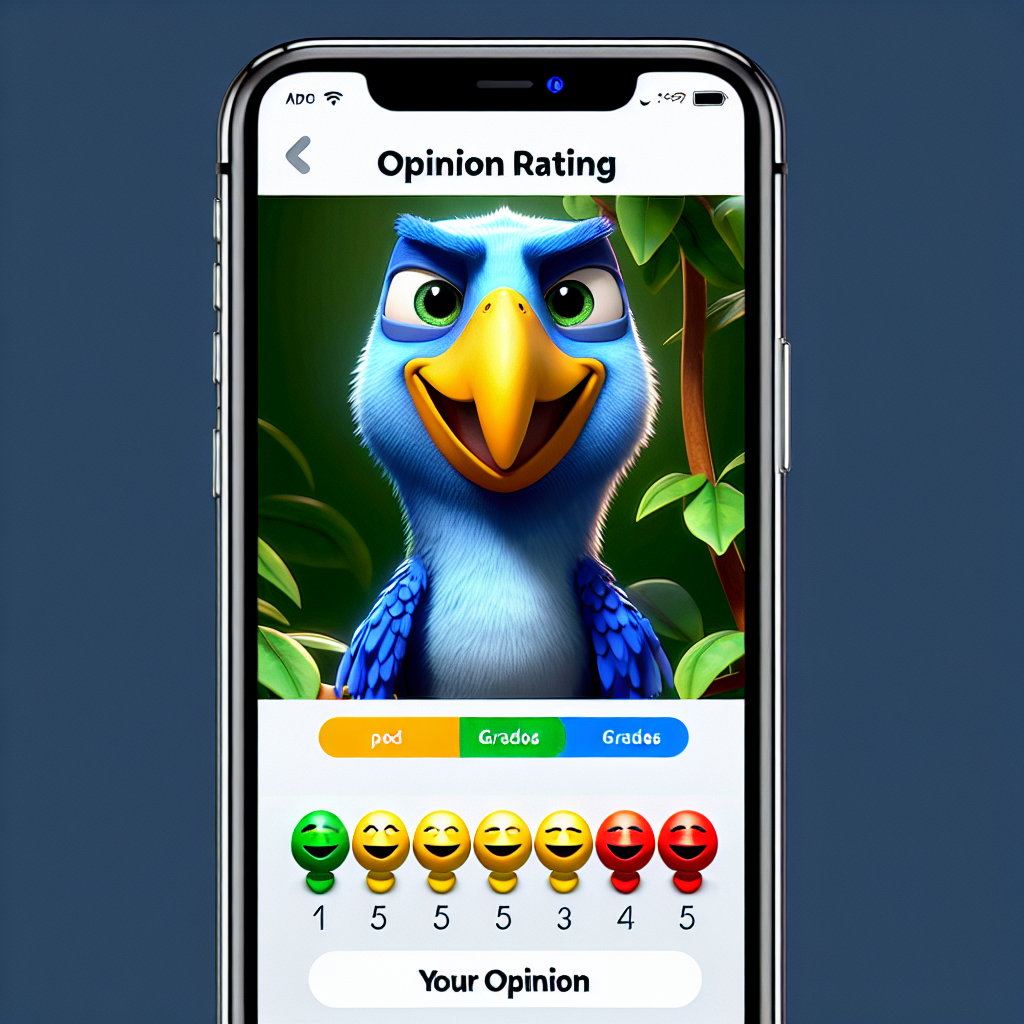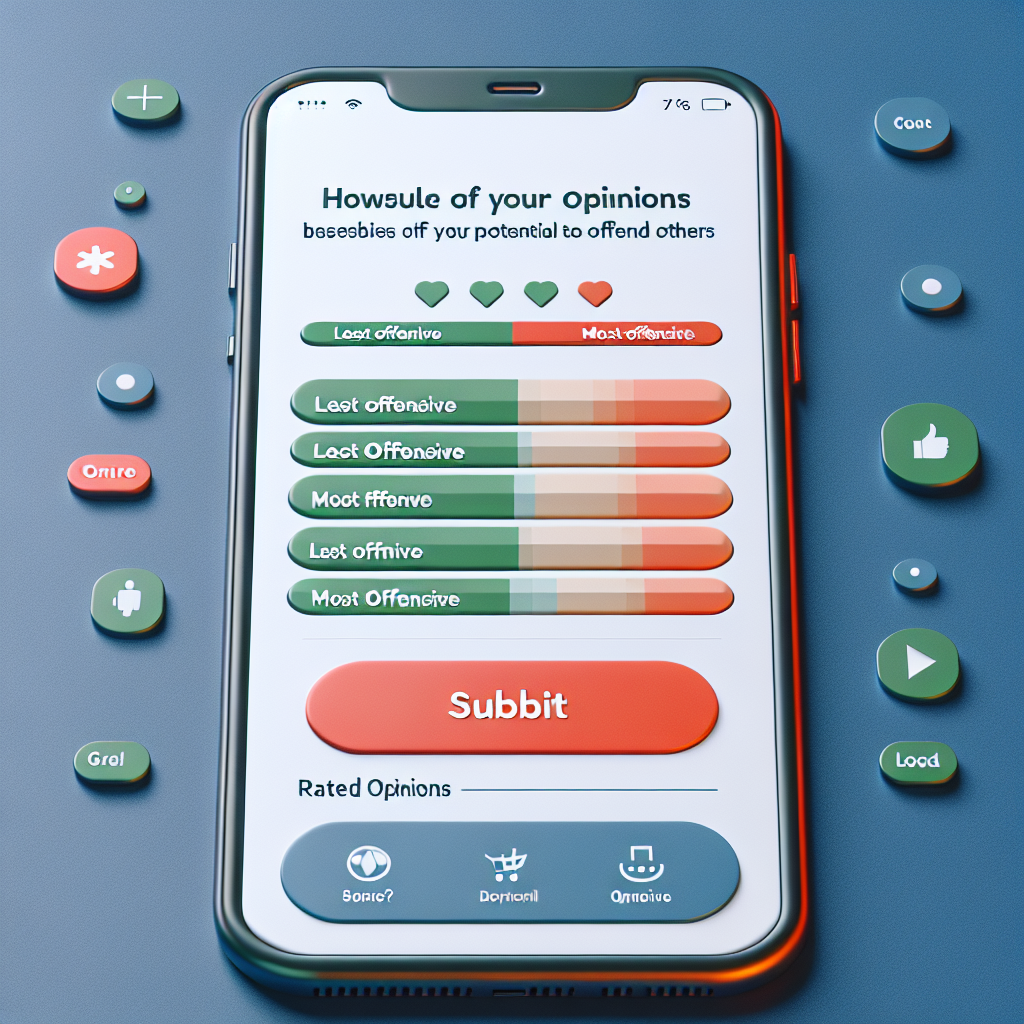Physical Address
304 North Cardinal St.
Dorchester Center, MA 02124
Physical Address
304 North Cardinal St.
Dorchester Center, MA 02124

In today’s digital age, there seems to be an app for everything. From ordering food to finding a date, there is no shortage of options when it comes to mobile applications. However, with the rise of social media and the increasing use of technology in our daily lives, there has been a growing concern about the impact of offensive content in new apps.
Recently, a new app has been making headlines for its unique approach to rating opinions. This app claims to use artificial intelligence to analyze the potential offensiveness of a user’s opinions before they are shared on social media. The idea behind this app is to prevent users from posting offensive content and to promote more respectful and inclusive online interactions.
On the surface, this may seem like a positive step towards creating a more harmonious online community. However, upon closer examination, there are several concerns that arise with the use of such an app.
Firstly, the concept of “offensiveness” is highly subjective. What one person may find offensive, another may not. This app claims to use AI to determine the level of offensiveness, but how accurate can a machine be in understanding the nuances of human language and context? This raises questions about the reliability and effectiveness of the app in accurately rating opinions.
Moreover, the use of this app may also lead to self-censorship. Users may become hesitant to express their opinions, even if they are not intended to be offensive, for fear of being flagged by the app. This could potentially stifle free speech and limit the diversity of opinions on social media platforms.
Another concern is the potential for bias in the app’s algorithm. AI systems are only as unbiased as the data they are trained on. If the data used to train this app is biased, it could result in discriminatory or unfair ratings of opinions. This could have serious consequences, especially for marginalized communities whose voices may already be underrepresented.
Furthermore, the use of this app may also perpetuate the idea of a “cancel culture” where individuals are ostracized for expressing opinions that may be deemed offensive. While it is important to hold people accountable for their actions and words, the use of an app to rate opinions may lead to a culture of fear and intolerance, rather than promoting healthy and respectful discussions.
Additionally, the app’s focus on avoiding offense may also hinder important conversations and debates. In order to address and challenge societal issues, it is necessary to have difficult and uncomfortable conversations. By censoring opinions, this app may prevent these conversations from happening and hinder progress towards a more inclusive society.
It is also worth considering the potential impact on mental health. Social media has already been linked to negative effects on mental health, and the use of an app that constantly rates and judges opinions may only add to this. It could lead to increased anxiety and self-doubt, as users may constantly worry about being offensive or being judged by the app.
In conclusion, while the intention behind this app may be well-meaning, the potential consequences and concerns cannot be ignored. The impact of offensive content in new apps is a complex issue that requires careful consideration and discussion. It is important to find a balance between promoting respectful online interactions and preserving free speech and diversity of opinions. Ultimately, it is up to individuals to be responsible for their own words and actions, rather than relying on an app to dictate what is deemed acceptable.

In today’s digital age, there seems to be an app for everything. From tracking your fitness goals to ordering food delivery, there is no shortage of apps to make our lives easier. However, a new app has recently sparked controversy and raised questions about the fine line between humor and offense in app development.
The app, called “Offend-O-Meter,” claims to rate your opinions based on their potential to offend others. It works by analyzing your social media posts and interactions, as well as your browsing history, to determine how likely your opinions are to cause offense. The app then assigns a score to each of your opinions, with higher scores indicating a higher likelihood of causing offense.
On the surface, this may seem like a harmless and even humorous concept. After all, we live in a society where political correctness and sensitivity are highly valued. However, upon closer examination, this app raises some serious concerns.
First and foremost, the app relies on algorithms and data analysis to determine what is considered offensive. This raises the question of who is responsible for creating these algorithms and what biases may be present. In a world where diversity and inclusivity are crucial, it is important to consider the potential for these algorithms to perpetuate harmful stereotypes and discrimination.
Furthermore, the app assumes that there is a clear line between what is offensive and what is not. However, this is not always the case. What may be considered offensive to one person may not be to another. This app oversimplifies a complex issue and fails to take into account the nuances of individual perspectives and experiences.
Moreover, the app promotes self-censorship and conformity. By assigning a score to our opinions, it encourages us to alter our thoughts and beliefs to fit within a certain societal standard. This goes against the very essence of free speech and the right to express ourselves.
Additionally, the app reinforces the idea that it is our responsibility to avoid offending others, rather than promoting open and respectful dialogue. It places the burden on individuals to constantly monitor and filter their thoughts and opinions, rather than encouraging a healthy exchange of ideas and perspectives.
Of course, there is a difference between intentionally causing harm and expressing an opinion that may be deemed offensive. However, this app fails to distinguish between the two. It reduces complex issues to a simple score, without taking into account the intent behind the opinion.
In the world of app development, it is important to consider the potential impact of our creations. While humor can be a powerful tool, it is crucial to be mindful of the potential to cause harm or perpetuate harmful stereotypes. As developers, we have a responsibility to promote inclusivity and diversity, rather than perpetuating harmful biases.
In conclusion, the “Offend-O-Meter” app highlights the need for a deeper understanding of the fine line between humor and offense in app development. It raises important questions about the role of technology in shaping our thoughts and beliefs, and the responsibility of developers to promote inclusivity and diversity. As we continue to navigate the ever-evolving digital landscape, it is crucial to consider the potential impact of our creations and strive for a more inclusive and respectful society.
In today’s digital age, it seems like there is an app for everything. From tracking your fitness goals to ordering food delivery, there is no shortage of apps to make our lives easier. However, with the rise of social media and online communication, there has also been an increase in offensive and harmful content being shared online. In response to this issue, a new app has been developed that aims to rate your opinions based on their potential to offend others.
The app, called “Offend-O-Meter,” uses a complex algorithm to analyze the language and tone of your opinions and determine how likely they are to cause offense. It then assigns a rating to your opinion, ranging from “mildly offensive” to “highly offensive.” The idea behind this app is to encourage users to think before they post or share their opinions online, and to promote responsible content creation.
One of the main concerns with the rise of social media and online communication is the spread of hate speech and offensive content. With the click of a button, anyone can share their thoughts and opinions with a wide audience, often without considering the potential impact of their words. This can lead to hurtful and damaging content being shared and perpetuated, causing harm to individuals and communities.
The creators of Offend-O-Meter hope that by providing users with a rating for their opinions, it will encourage them to think critically about the potential impact of their words. This app is not meant to censor or restrict free speech, but rather to promote responsible and considerate communication online.
One of the key features of Offend-O-Meter is its ability to provide users with feedback on why their opinion received a certain rating. This allows users to understand the specific language or tone that may have caused offense and to learn from their mistakes. It also provides an opportunity for users to reflect on their own biases and prejudices, and to consider how their words may affect others.
The app also has a reporting feature, where users can flag offensive content and bring it to the attention of the app’s moderators. This helps to create a community of responsible users who are actively working towards creating a more inclusive and respectful online environment.
Some may argue that this app goes against the principle of free speech and that it is not the responsibility of individuals to censor their own opinions. However, it is important to recognize that with the power and reach of social media, our words have the potential to cause harm and perpetuate harmful ideologies. By using Offend-O-Meter, individuals can take responsibility for their own words and actively work towards creating a more positive and respectful online space.
Of course, this app is not a perfect solution to the issue of offensive content online. It relies on the accuracy and fairness of its algorithm, which may not always be perfect. It also does not address the root causes of hate speech and offensive content, such as systemic discrimination and prejudice. However, it is a step in the right direction towards promoting responsible and considerate communication online.
In conclusion, the development of Offend-O-Meter is a response to the growing concern of offensive and harmful content being shared online. By providing users with a rating for their opinions and promoting responsible content creation, this app aims to create a more inclusive and respectful online environment. While it may not be a perfect solution, it is a step towards addressing the issue of potential offense in new apps and promoting responsible communication online.